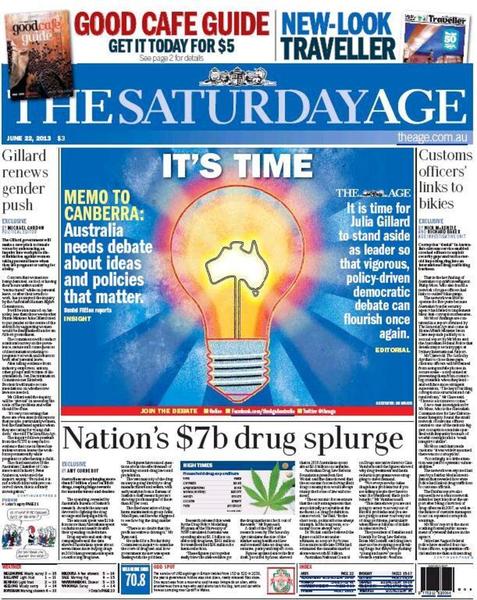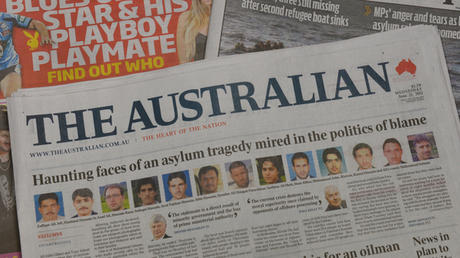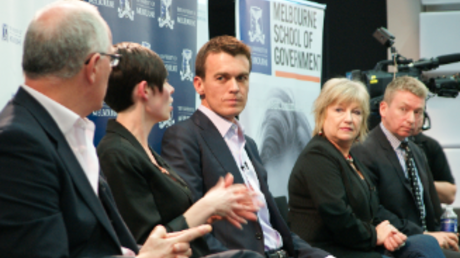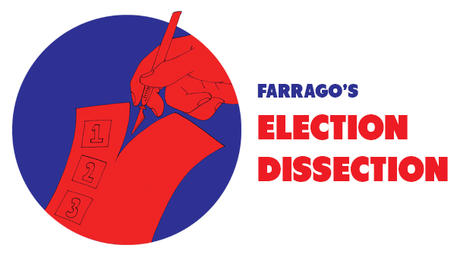 ON THE Saturday before the spill that ended Julia Gillard's prime ministership, The Age newspaper ran an editorial advocating her resignation.
ON THE Saturday before the spill that ended Julia Gillard's prime ministership, The Age newspaper ran an editorial advocating her resignation.
The reason The Age thought Gillard should step aside was, the editorial said, "so that vigorous, policy-driven democratic debate can flourish once again".
According to the editorial, the Australian public had stopped listening to the Prime Minister, and that meant Tony Abbott was likely to win power without "a proper contest of ideas".
It was not the first time that The Age had called for a sitting Prime Minister to stand aside.
As the editor Andrew Holden said later in defending the editorial, the paper called for Gough Whitlam to resign in 1975 during the supply crisis, and had also supported John Howard stepping down in favour of Peter Costello.
But to the best of my knowledge, it was the first time that a major Australian newspaper had stated that it was necessary for a political leader to stand aside because their incumbency threatened the contest of ideas.
Once, the serious media regarded ensuring there was vigorous policy debate as part of its role.
An assertion that the policy debate was lacking would have been to acknowledge a failure of the media, as much as a failure of political leadership.
My colleague, Denis Muller, has outlined the journalistic ethical considerations surrounding the Gillard collapse in an article in The Conversation.
He suggests that the media has fallen in to a kind of "passive neutrality" in which it has failed to provide context and report all relevant facts.
Even when journalists are trying to be impartial, the result of "passive neutrality" is a kind of directionless, incidental bias, brought about by journalists being blown hither and thither by events and the agendas of the politicians. He or she who blows hardest gets the best media coverage.
It is easy to see The Age's editorial as another symptom of this, with its implicit assumption that if the politicians aren't good communicators, then there is little the media can be expected to do to foster or encourage policy debate.
Take the coverage of the last few days. Suddenly we are hearing about policy - carbon pricing, education, boat people and the national broadband network.
Is this because there is more policy substance coming from the Prime Minister, or because a new Prime Minister is "news", meaning that he gets coverage that was denied to his predecessor? Did Gillard fail to communicate, or did the media fail to adequately report her attempts at communication?
Without actually being part of the magic circle of political journalism, it is hard to judge. We depend on the news outlets to give us that vital contextual material to judge our politicians.
One of the challenges for media is to work out how politics and important issues can be reported without boring the audience
One of the challenges for media, is to work out how politics and important issues can be reported without boring the audience into turning off, as a survey conducted by the Centre for Advancing Journalism suggests they might already have done ()
No profession is changing faster than journalism. For the first time in human history, most people in developed countries are able to publish their news and thoughts to the world within a few minutes of deciding to do so.
Meanwhile, the big media organisations are in decline, and a new blog, website, or social-media presence emerges almost every hour.
In this context, journalists should be thinking hard about what they do that makes their work valuable. What can a professional journalist add or offer that lifts them above public relations, or amateur blogs?
The consumption of news
Contrary to what is often stated, there is no evidence that people in Australia have lost their hunger for news and information.
There are more readers of newspaper content — whether it is delivered online or in hard copy — than ever before.
Our main commercial television channels have spawned multichannels in the last few years, and many more news bulletins through the day.
All these news services draw healthy audiences, and the viewer figures tell us many people watch multiple news programs in a single day.
Add to that the constant swapping of news and views on Facebook, Twitter, through text messages and on blogs, and we can see that news remains at the centre of our lives.
The crisis of mainstream media is to do with business models, and the disappearance of a premium position as carriers of advertising, not with declining appetite for news.
However, the changes have led to a hollowing out of the mainstream media newsrooms, both in terms of journalistic numbers and terms of the time available to properly investigate stories.
Trying to get to grips with these questions is one reason that the Centre for Advancing Journalism is, during this election, leading the Citizens' Agenda project.
Voters in ten key electorates can use the OurSay social media website to address questions to their candidates.
This project will allow us to study whether the use of social media can improve voters’ political engagement, and whether it can influence the way that journalists report politics.
A 'citizens' agenda'
The idea of a “citizens’ agenda” to enliven political reporting first arose during the 1990s civic or public journalism movement in the United States, of which New York University Professor Jay Rosen was a founder.
In 2010, Professor Rosen was visiting Australia during the election campaign that led to the Gillard minority government.
Inspired - or depressed -- by what he observed in Australia, Rosen suggested that four-to-six months before an election campaign begins, the media should ask citizens not who they are going to vote for or which party they favour, but what they want the candidates to be discussing as they compete for votes.
Having established a “citizens’ agenda” of issues, Rosen suggested, media organisations should pursue these issues, regardless of whether or not they were on the “agenda” of the political parties.
It may be that Citizens' Agenda style exercises help to build that connection, making journalism a form of community work and community facilitation, as well as news reporting.
Or it may not work, or work differently in different places and at different times. We should have our results ready for publication early next year. You can read more about the exercise here (link http://www.thecitizen.org.au/analysis/coober-pedy-city-forum-ordinary-ci...) and participate here (http://oursay.org/citizens-agenda)
The media’s role in democracy
In submissions to the various inquires of the last two years, Australia's media outlets have stated that their role is to question politicians and the powerful, to contest ideas, to "question, critique and to challenge government and the political process," to quote Fairfax Media's submission to the Finkelstein inquiry.
Nowhere in these submissions was there any statement suggesting that these things could only be done effectively when the political leadership was effective, or when politicians were good communicators. If we accept that attitude, then we weaken the argument for media freedom.
One of the urgent challenges in this election is for journalists and the news media to work out how politics can be reported, and the contest of ideas be promoted and joined, without boring the audience into turning off.
This is a core responsibility of the media, no matter who is leading the country.
Ths article has also been published in The Citizen




